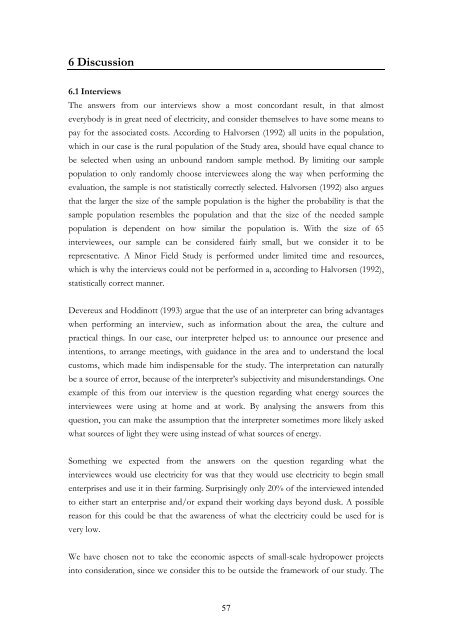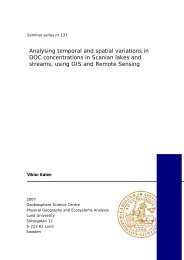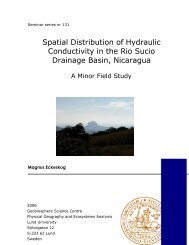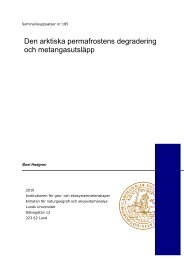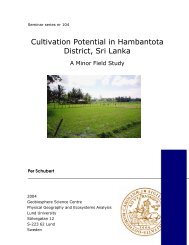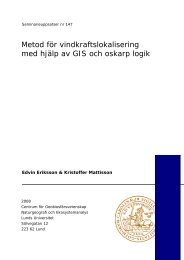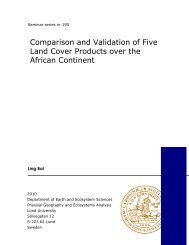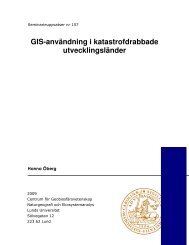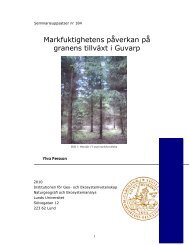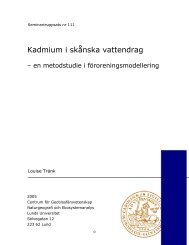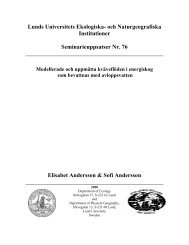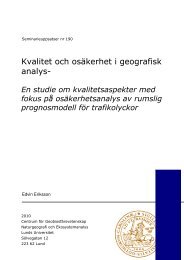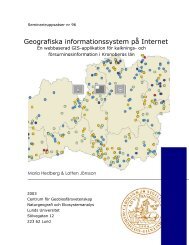Finding Potential Sites for Small-Scale Hydro Power in Uganda: a ...
Finding Potential Sites for Small-Scale Hydro Power in Uganda: a ...
Finding Potential Sites for Small-Scale Hydro Power in Uganda: a ...
Create successful ePaper yourself
Turn your PDF publications into a flip-book with our unique Google optimized e-Paper software.
6 Discussion6.1 InterviewsThe answers from our <strong>in</strong>terviews show a most concordant result, <strong>in</strong> that almosteverybody is <strong>in</strong> great need of electricity, and consider themselves to have some means topay <strong>for</strong> the associated costs. Accord<strong>in</strong>g to Halvorsen (1992) all units <strong>in</strong> the population,which <strong>in</strong> our case is the rural population of the Study area, should have equal chance tobe selected when us<strong>in</strong>g an unbound random sample method. By limit<strong>in</strong>g our samplepopulation to only randomly choose <strong>in</strong>terviewees along the way when per<strong>for</strong>m<strong>in</strong>g theevaluation, the sample is not statistically correctly selected. Halvorsen (1992) also arguesthat th e larger the size of the sample population is the higher the probability is that thesample population resembles the population and that the size of the needed samplepopulation is dependent on how similar the population is. With the size of 65<strong>in</strong>terviewees, our sample can be considered fairly small, but we consider it to berepresentative.A M<strong>in</strong>or Field Study is per<strong>for</strong>med under limited time and resources,which is why the <strong>in</strong>terviews could not be per<strong>for</strong>med <strong>in</strong> a, accord<strong>in</strong>g to Halvorsen (1992),statistically correct manner.Devereux and Hodd<strong>in</strong>ott (1993) argue that the use of an <strong>in</strong>terpreter can br<strong>in</strong>g advantageswhen per<strong>for</strong>m<strong>in</strong>g an <strong>in</strong>terview, such as <strong>in</strong><strong>for</strong>mation about the area, the culture andpractical th<strong>in</strong>gs. In our case, our <strong>in</strong>terpreter helped us: to announce our presence and<strong>in</strong>tentions, to arrange meet<strong>in</strong>gs, with guidance <strong>in</strong> the area and to understand the localcustoms, which made him <strong>in</strong>dispensable <strong>for</strong> the study. The <strong>in</strong>terpretation can naturallybe a source of error, because of the <strong>in</strong>terpreter’s subjectivity and misunderstand<strong>in</strong>gs. Oneexample of this from our <strong>in</strong>terview is the question regard<strong>in</strong>g what energy sources the<strong>in</strong>terviewees were us<strong>in</strong>g at home and at work. By analys<strong>in</strong>g the answers from thisquestion, you can make the assumption that the <strong>in</strong>terpreter sometimes more likely askedwhat sources of light they were us<strong>in</strong>g <strong>in</strong>stead of what sources of energy.Someth<strong>in</strong>g we expected from the answers on the question regard<strong>in</strong>g what the<strong>in</strong>terviewees would use electricity <strong>for</strong> was that they would use electricity to beg<strong>in</strong> smallenterprises and use it <strong>in</strong> their farm<strong>in</strong>g. Surpris<strong>in</strong>gly only 20% of the <strong>in</strong>terviewed <strong>in</strong>tendedto either start an enterprise and/or expand their work<strong>in</strong>g days beyond dusk. A possiblereason <strong>for</strong> this could be that the awareness of what the electricity could be used <strong>for</strong> isvery low.We have chosen not to take the economic aspects of small-scale hydropower projects<strong>in</strong>to consideration, s<strong>in</strong>ce we consider this to be outside the framework of our study. The57


